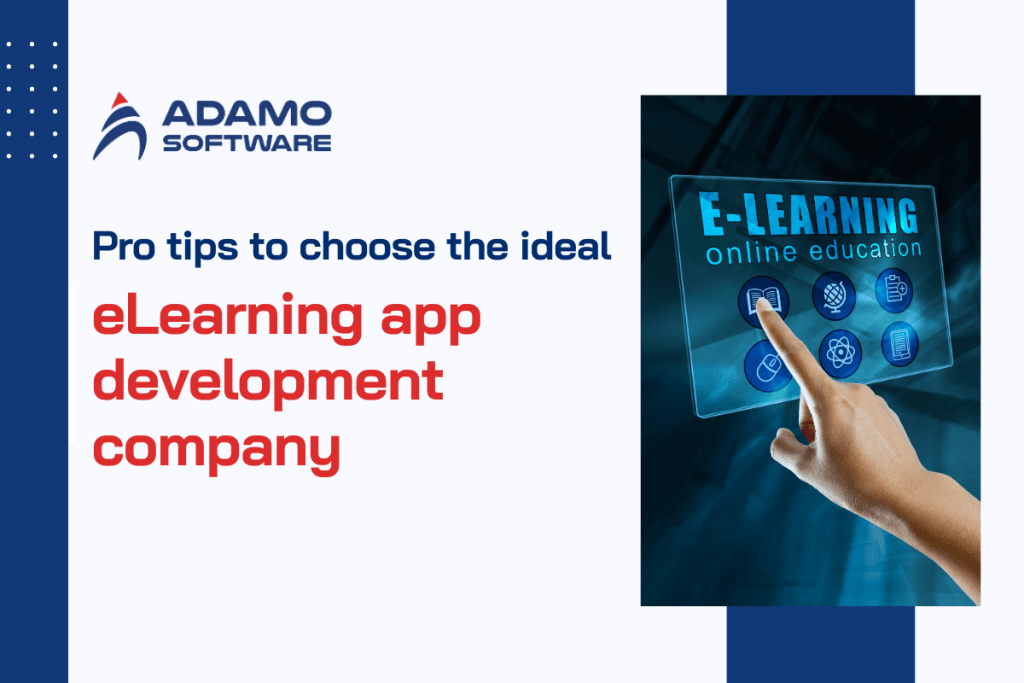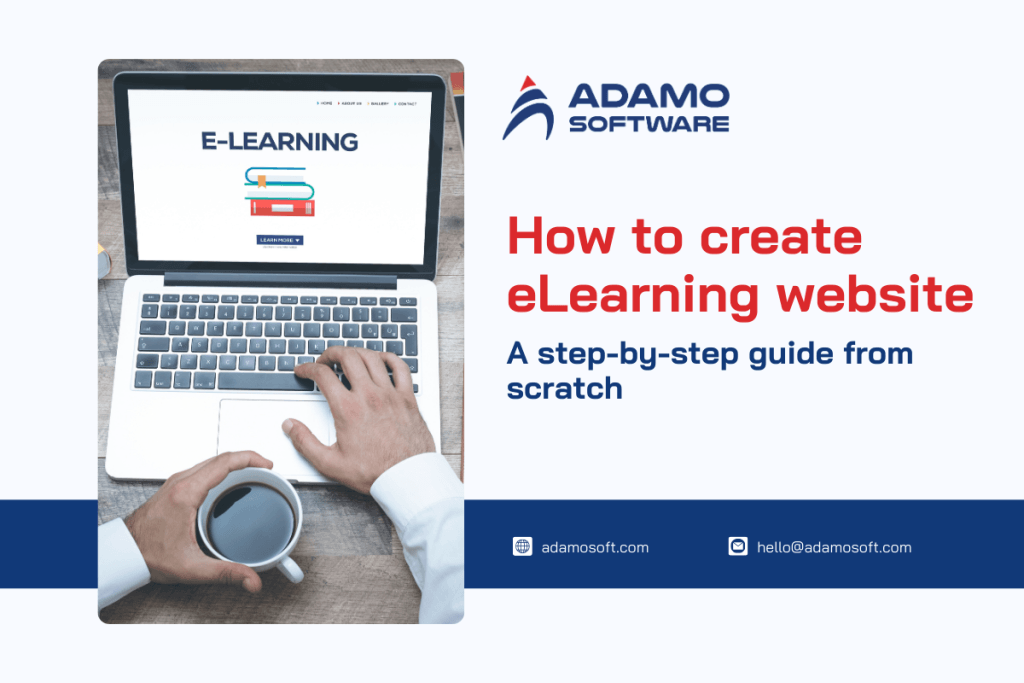Explore best examples of online learning platforms for all use cases
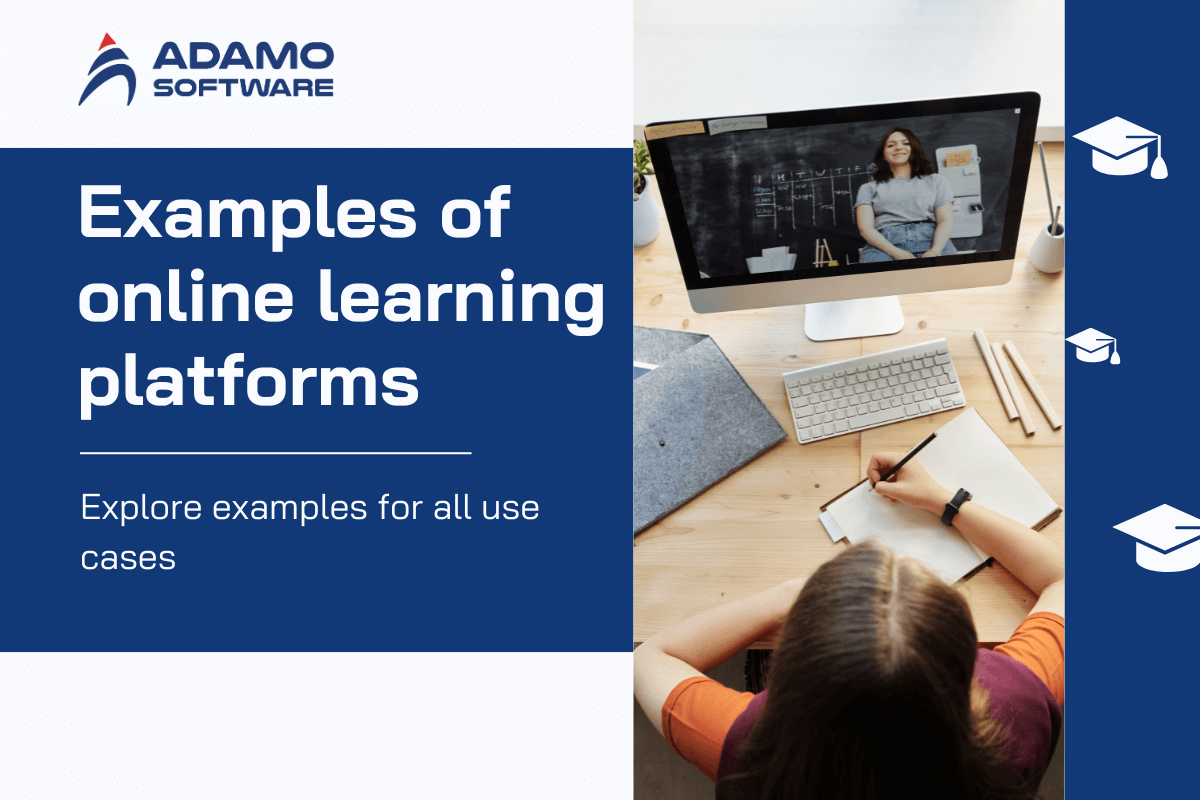
In today’s digital world, the need for online learning is becoming popular due to the benefits it brings. From educational institutions to business enterprises and individuals, online learning platforms are useful tools that meet different needs. Looking for online courses but unsure which platforms to choose? Let Adamo Software give you some outstanding examples of online learning platforms.
Through this blog post, you will find detailed information about popular types of online learning platforms and the impact of online learning platforms on education. Besides, you will know the features, benefits, and pricing of the best examples of online learning platforms. Additionally, future trends to consider in online learning will also be discussed. All of the information has been carefully researched and updated with the latest trends.
I. Popular types of online learning platforms
Before going into further discussion about the top examples of online learning platforms, it is necessary to know about popular types of online learning platforms. Depending on the aim of use, there are many types of platforms to suit specific needs. From massive open online courses to learning management systems and corporate training platforms, each platform brings distinct benefits. Let’s learn about these types below.
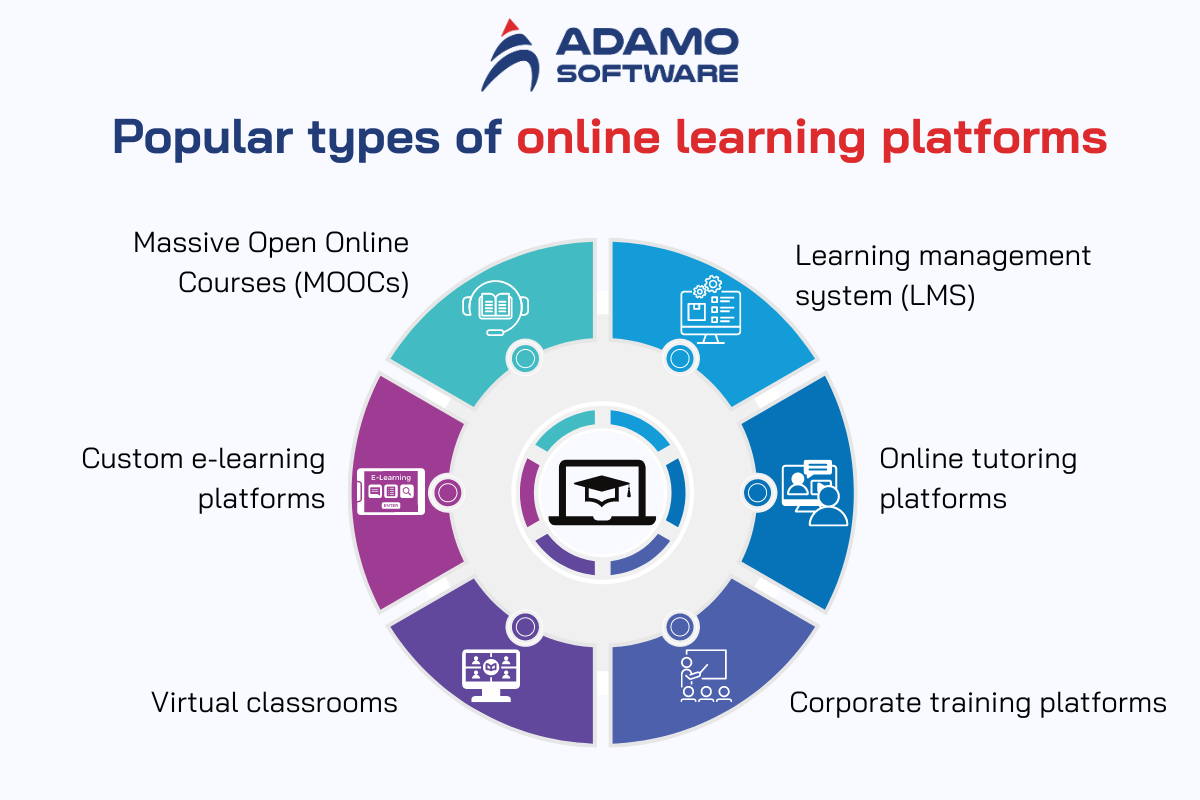
1. Massive open online courses (MOOCs)
MOOCs are online platforms that provide free or paid courses, reaching many learners globally. These platforms often partner with top universities and prestigious organizations, providing high-quality content across a wide range of fields such as science, business, technology, and the arts.
Besides traditional resources like video lectures, reading materials, and assignments, many MOOCs also provide user-interactive forums to support the community among students, professors, and tutors.
Learners can flexibly participate according to their own schedule. Besides, courses from MOOC platforms often provide certificates upon completion, enabling learners to enhance their professional qualifications and job profiles. This is extremely useful for those who want to develop new skills without being bound by time and space as in traditional learning.
Popular platforms for MOOCs are also some examples of online learning platforms. They are Coursera, edX, FutureLearn, etc. Coursera features thousands of courses from top universities like Stanford, Yale, and tech companies like Google. Whereas, edX offers a wide range of courses across a variety of subjects, and FutureLearn focuses on social learning experiences.
2. Learning management system (LMS)
LMS is a software that provides essential functions to create, manage, distribute, and monitor online courses. Educational institutions, businesses, and training organizations often use LMS to track the learners’ learning progress and assess the learners’ outcomes. With diverse features such as learning material management, online classroom organization, and automated assessment tools, LMS platforms help improve teaching and learning efficiency, while creating a modern, interactive learning environment.
Moodle, Blackboard, và Canvas are three popular LMS software and examples of online learning platforms.
Moodle is an open-source, customizable, and scalable platform, suitable for schools and organizations that want complete control over their systems. Blackboard is outstanding with its powerful course management, student support features, and diverse integration capabilities. Whereas, Canvas is favored due to its cross-platform accessibility and mobile learning support, creating a seamless learning experience for both teachers and students.
3. Custom e-learning platforms
Custom e-learning platforms allow users to create and manage course content themselves. These platforms provide flexible tools to personalize content, interfaces, and learning experiences according to organizational or individual goals. For example, Thinkific and Teachable enable instructors to create courses with a variety of content types such as videos, quizzes, and interactive materials. They are ideal choices for those looking to build their personal brand or small businesses looking to deploy online training effectively.
4. Virtual classrooms
Virtual classroom platforms provide online spaces for instructors and learners to interact with each other through video, sound, and other supportive tools like video recording, group discussion room, whiteboard, etc. This creates a flexible learning experience for users. They can learn and discuss without being limited by geographical distance. These platforms are suitable for both formal education and corporate training.
Some examples of online learning platforms of this type include Zoom, Google Meet, and Microsoft Teams. These platforms provide powerful interactive tools that facilitate online learning at all levels.
5. Online tutoring platforms
Online tutoring platforms connect tutors with learners online. They provide real-time or personalized learning guidance. These platforms are the most suitable for students who want to enhance their specialized knowledge. They typically support a wide range of subjects, from math to languages to technical skills.
Like virtual classrooms, online tutoring platforms also offer tools like screen sharing and interactive whiteboards. Besides they also integrate video calls and progress tracking exercises features. When it comes to examples of online learning platforms for online tutoring, you can consider using Chegg Tutors, Wyzant, and Preply. They help you to access high-quality tutors from everywhere in the world, flexible on time and cost.
6. Corporate training platforms
E-learning platforms are essential for businesses to facilitate learning for employees to learn from anywhere and at any time. These platforms bring many long-term benefits to both businesses and employees. These benefits include cost-saving, reducing learning time for employees, retaining employees, providing timely feedback, measuring employee performance, and building a learning culture. Udemy for Business, SAP Litmos, and Docebo are some examples of online learning platforms that are suitable for businesses.
II. Impact of online learning platforms on education
Online learning platforms have made significant changes in the educational sector, bringing more opportunities for instructors and learners. By combining technology and education, these platforms help expand access to knowledge, personalize learning, and increase interaction in the teaching environment. So, what are the impacts of online learning platforms on education? Let Adamo Software answer this question.
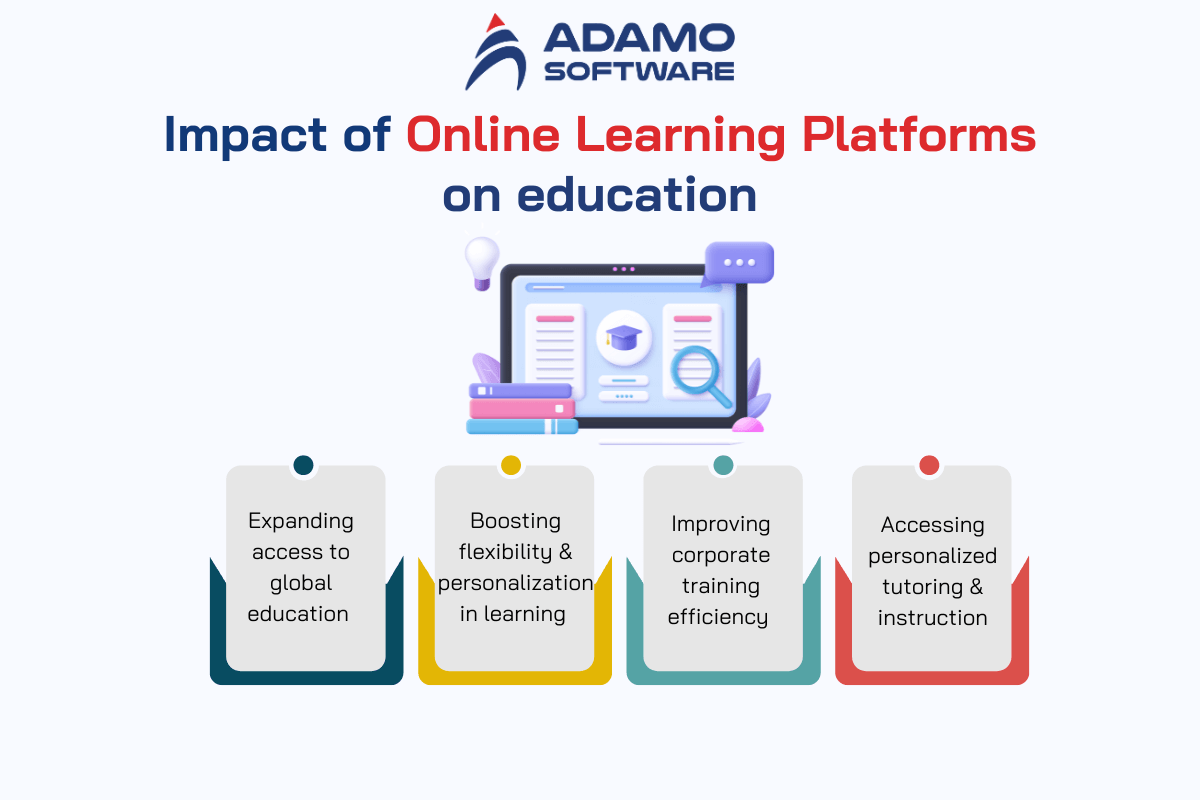
1. Expanding access to global education
Online learning platforms help to expand access to global education by eliminating distance and geographical barriers. Examples of online learning platforms like Coursera and edX allow learners to approach courses from prestigious universities and institutions around the world. This helps personalize learning with in-depth, tailored courses.
Besides, many online platforms offer content in multiple languages, making it easy for learners from different cultures to access knowledge without facing language barriers. Multilingual support helps online learning platforms meet the needs of learners from different cultures, promoting inclusion and equality in access to high-quality education.
Multilingual courses not only provide specialized knowledge but also create opportunities for students to learn about different cultures. This enhances understanding and cultural exchange in a global learning environment.
2. Boosting flexibility and personalization in learning
Boosting flexibility and personalization in learning is also among the impacts of online learning platforms on education. Here’s how they directly influence education.
- Scheduling learners’ studies according to their personal needs
Many online learning platforms allow students to flexibly choose study times that suit their schedules. This helps students easily combine learning with other activities in life. Thinkific and Teachable are two examples of online learning platforms that provide good support in this area.
- Customizing course content
Online learning platforms offer the ability to personalize learning content. This enables learners to choose modules and topics they are interested in and suitable to their learning goals. Thanks to this, learning effectiveness and student engagement can be improved.
- Creating interactive learning experiences
Thanks to tools like tutorial videos, interactive exercises, and immediate feedback integrated into online learning platforms, learners can improve their skills based on individual learning outcomes. Udemy is among the outstanding examples of online learning platforms that help learners with this.
3. Improving corporate training efficiency
Online learning platforms have a huge impact on businesses, helping to improve corporate training efficiency. Let’s see how they help with Adamo Software!
- Providing specialized courses for each industry
With specialized courses from online learning platforms, employees can upgrade their professional skills in line with job requirements and industry trends. As mentioned, Udemy for Business, SAP Litmos, and Docebo are some representative examples of online learning platforms that help businesses. These platforms often offer courses tailored to corporate training needs.
- Creating training programs on request
Online learning platforms allow businesses to create customized training programs that align with the organization’s specific goals and strategies. This helps optimize training effectiveness and ensures that courses meet the specific needs of the business.
- Monitoring and evaluating learning progress
Tracking and analytics tools in online learning platforms help businesses assess employee progress. Besides, they can identify areas for improvement and adjust training programs.
- Enhancing interaction and collaboration
Platforms like Microsoft Teams and Zoom not only support learning but also create opportunities for employees to interact and collaborate. Group discussions, joint projects, and online seminars help to improve teamwork and communication skills.
4. Accessing personalized tutoring and instruction
Online learning platforms impact the learners’ ability to access personalized tutoring and instruction. Learners will have a chance to find and connect with tutors with expertise that fits their individual learning needs, from basic subjects to advanced areas. Online tutoring platforms allow students to receive personalized support and guidance, helping them address specific issues and improve weaknesses in their studies, from exam preparation to learning new skills.
III. Examples of online learning platforms for all use cases
Online learning platforms have become an indispensable part of the modern education system, providing flexible and convenient means for learners around the world. Below are some exceptional examples of online learning platforms for all use cases that you may want to refer to.
1. Coursera
Coursera is among the superior examples of online learning platforms that can be useful for schools, students, businesses, and employees. Let’s see how the platform supports each object.
- For schools and universities
For schools and universities, Coursera acts as a teaching aid, incorporating technology into education to create a more interactive and engaging learning experience. This platform also supports schools and universities in improving teachers’ expertise and teaching skills.
- The benefits of Coursera for students
Coursera enables students to access courses from prestigious universities, such as Stanford, Yale, or MIT. Once finishing the course, students can get certifications from those universities. Besides, it offers a wide range of courses at all levels, from beginner to advanced, which allows students to learn on demand and personalized.
- Coursera for business
Coursera for business is specifically designed for businesses to improve employee skills and capabilities. With various courses in different topics like information technology, health, arts, and social sciences, the businesses’ employees can access diverse knowledge, improving their ability to apply it in their daily work.
2. edX
Like Coursera, edX is also among the best examples of online learning platforms that benefit many objects. This platform enables schools and universities to create specialized certificate and degree programs online, expanding the reach of training without requiring large infrastructure.
 Besides, they can use edX to build custom online learning programs or use the platform’s learning management tools. For students, they can access knowledge from leading experts and educators. Moreover, they will have autonomy in time and learning speed.
Besides, they can use edX to build custom online learning programs or use the platform’s learning management tools. For students, they can access knowledge from leading experts and educators. Moreover, they will have autonomy in time and learning speed.
EDX Enterprise includes many outstanding features for businesses. They are self-paced learning, online discussion groups, etc. EdX LMS empowers leading organizations to deliver effective training to their employees, customers, and partners.
3. Moodle
Among the best examples of online learning platforms, Moodle is also outstanding with its benefits. Moodle provides a customizable and user-friendly platform for both teaching and learning. Its open-source nature allows businesses to tailor it to their specific needs without costly licensing fees, saving them money and maximizing the use of available resources for building an effective online training system.
Besides, this software also benefits schools and students. It provides a flexible and customizable learning management system that supports effective online teaching. Schools can easily manage courses and personalize the system, while students benefit from a user-friendly interface, collaboration tools, and the ability to track learning progress.
4. Thinkific
Thinkific is among the examples of online learning platforms in custom e-learning, focusing on providing tools for individuals and businesses to create bespoke online courses. What sets Thinkific apart from other examples of online learning platforms is the ability to design and build standalone courses, completely tailored to the creator’s needs. Here are some featured characteristics of Thinkific.
- Creating and customizing courses
Thinkific offers a powerful set of tools for designing, customizing, and managing online courses. This allows users to create content, choose layouts, and add videos, quizzes, and supporting materials.
- Personal or business branding
With Thinkific, users can design their own look and brand for their platform. Thus, they will not have to rely on the identity elements of a third-party platform.
- Integrated sales and marketing tools
Thinkific not only supports course creation but also helps users reach customers with integrated marketing tools. These tools include email management, data analytics, and payment options.
5. Zoom
Unlike other examples of online learning platforms, Zoom is an online conferencing platform, featuring virtual classroom support features, helping to create an interactive online learning environment. Let Adamo Software discuss the main features of Zoom for virtual classrooms.

- Supporting online conferences and live classes
Zoom offers the ability to create live video lessons. This allows instructors and students to interact in real-time, similar to a traditional classroom.
- Screen sharing and interactive tools
During classes, instructors can share their screens to present content, use virtual whiteboards, and create quizzes or surveys to increase interactivity. In addition, chat, polls, and raise hands features help increase participation and instant feedback during lessons.
- Breakout rooms
Zoom allows students to be divided into small groups for discussion. This helps to increase interactivity and create a flexible learning environment.
6. Chegg Tutors
Chegg Tutors is also among the superior examples of online learning platforms. It helps students connect with expert tutors in various fields. Chegg provides personalized tutoring services tailored to each student’s individual needs and goals.
Using Chegg Tutors platform, students can choose the learning schedule on their own. They can also choose to learn with the tutors they want. This can expand their learning opportunities and improve their academic quality.
In general, online learning platforms have expanded access to education, providing flexible and effective solutions for every learning need. The diversity and flexibility of the above examples of online learning platforms can enrich educational opportunities and help individuals and organizations optimize the learning process in a way that best suits their needs.
Also read: How to create an online learning platform: The ultimate roadmap to success
IV. Future trends to consider in online learning
In the future, the above examples of online learning platforms will continue to shape the way everyone learns and teaches with emerging trends. Below are some important trends to consider in online learning.
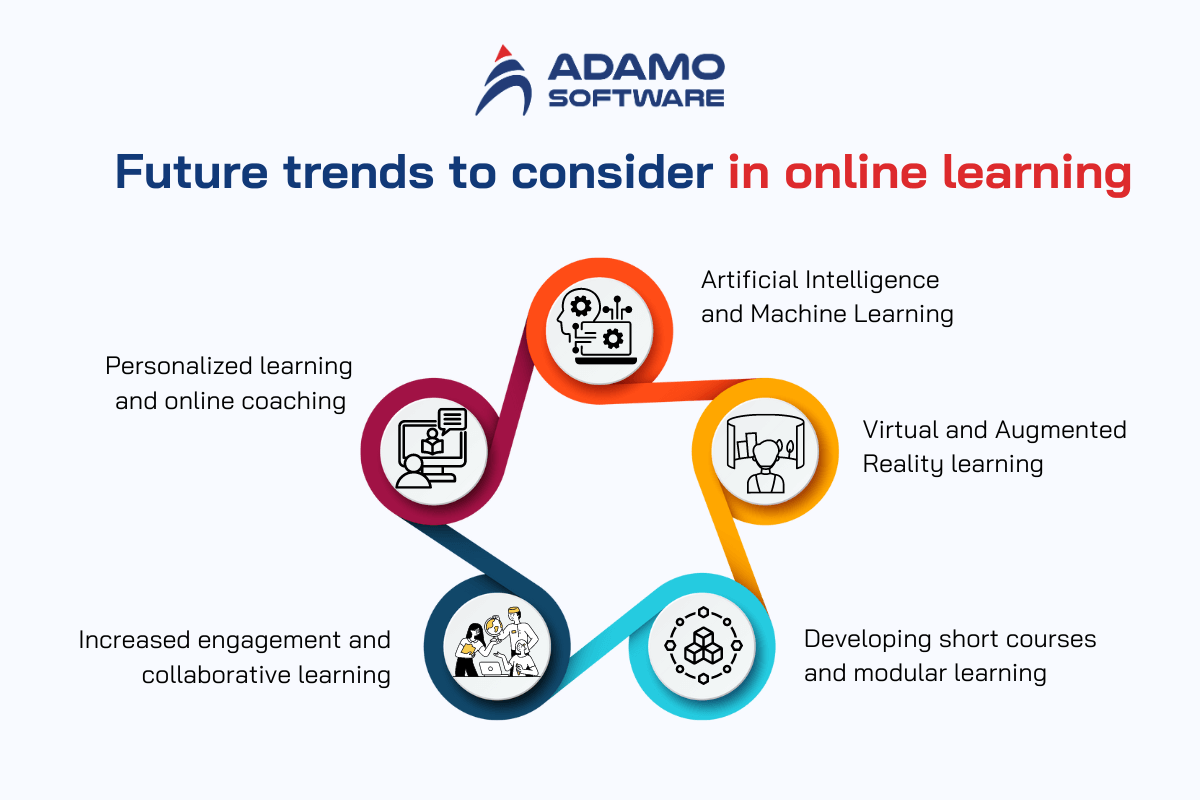
1. Artificial intelligence and machine learning
Online learning platforms are emerging with the development of artificial intelligence (AI) and machine learning (ML). AI is being widely used in online training to personalize the learning experience. This helps employees focus on the knowledge they lack while ensuring the learning process is more effective. Outstanding examples of online learning platforms like Coursera and edX are starting to incorporate AI to personalize the learning experience. AI can analyze a user’s learning data and provide relevant content and exercises to optimize learning outcomes.
2. Virtual and augmented reality learning
Virtual and augmented reality learning is a prominent trend in the future. Virtual reality (VR) and augmented reality (AR) technologies will change how everyone approaches learning. Examples of online learning platforms like Thinkific and Readable can apply VR technology to create immersive virtual classrooms, helping students experience lessons in a more intuitive and interactive way.
3. Developing short courses and modular learning
The trend of flexible learning with short courses and modules on platforms like Udemy and LinkedIn Learning is on the rise. Learners can choose short courses to quickly meet specific learning needs and improve skills.
4. Increased engagement and collaborative learning
Excellent examples of online learning platforms like Microsoft Teams and Google Meet will continue to improve their support for engagement and collaboration in the virtual classroom. Features like breakout rooms, live discussions, and real-time feedback will be expanded to enhance teacher-student interaction.
5. Personalized learning and online coaching
Tutoring platforms like Chegg Tutors will increasingly focus on providing personalized learning services. This helps students receive detailed and tailored support to their specific needs.
Overall, these trends not only reflect innovation in educational technology but also enrich learning methods on examples of online learning platforms. This brings more flexible, interactive, and personalized learning experiences for learners.
V. Creating an online learning platform with Adamo Software
Are you looking for a unit that can help you with your online learning platform development? If yes, Adamo Software can be your choice. As one of Vietnam’s leading software development companies, Adamo Software is confident in this field. We provide customized and flexible solutions for e-online learning platform development, making it easy for organizations and individuals to create systems that meet their specific needs. Here are the main steps to building an online learning platform with Adamo Software.

- Requirements assessment and identification
- Customizing and developing
- Deploying and fine-tuning the system
- User training and support
- Monitoring and improving
- Building a powerful, flexible, and customizable online learning platform



